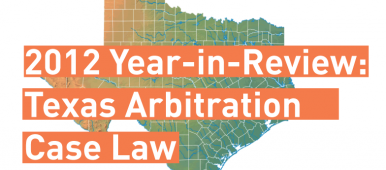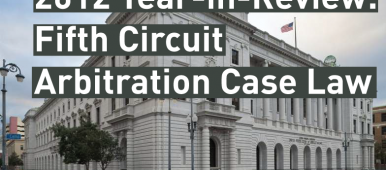
- Mediation
- Arbitration
- Court Neutrals
- Online Dispute Resolution
- Technology
- Court Decisions
- More
- Legislation
- Healthcare
- Guest Posts
- John DeGroote
- John C. Fleming
- Rick Freeman
- Professor Peter Friedman
- Honorable W. Royal Furgeson, Jr.
- James M. Gaitis
- Laura A. Kaster
- Professor John Lande
- Philip J. Loree, Jr.
- Michael McIlwrath
- F. Peter Phillips
- Professor Alan Scott Rau
- Professor Thomas J. Stipanowich
- Professor S.I. Strong
- Richard Webb
- Glen M. Wilkerson
- International arbitration
- Regulation
- Sports and Entertainment
- We’re Back!!!!Well, it’s been a while since we published and that is about to change. Since I spent much of last year becoming
 JAMS Welcomes Karl Bayer to its Panel of NeutralsJAMS, the world’s largest private alternative dispute resolution (ADR) provider, is pleased to announce that Karl Bayer
JAMS Welcomes Karl Bayer to its Panel of NeutralsJAMS, the world’s largest private alternative dispute resolution (ADR) provider, is pleased to announce that Karl Bayer Class Action Waivers in Arbitration Agreements: The Twenty-First Century Arbitration Battleground and Implications for the EU CountriesLinda S. Mullenix, Morris & Rita Atlas Chair in Advocacy at the University of Texas School of Law, has written “Class Ac
Class Action Waivers in Arbitration Agreements: The Twenty-First Century Arbitration Battleground and Implications for the EU CountriesLinda S. Mullenix, Morris & Rita Atlas Chair in Advocacy at the University of Texas School of Law, has written “Class Ac Picking the Proper Technological Tool for Problem-Solving in ArbitrationProfessor Amy J. Schmitz, John Deaver Drinko-Baker & Hostetler Chair in Law and Co-Director of the Translational Data An
Picking the Proper Technological Tool for Problem-Solving in ArbitrationProfessor Amy J. Schmitz, John Deaver Drinko-Baker & Hostetler Chair in Law and Co-Director of the Translational Data An
Recent Posts
Texas 83rd Legislative Session Begins
The 83rd Texas Legislative Session began on Tuesday, January 8, 2013. You may monitor bills as they move through the Texas Legislature here. Additionally, you may view individually filed House and Senate bills. The last day of the Regular Texas Legislative Session will be May 27, 2013. An 83rd Texas Legislature “Dates of Interest” calendar is available here. Stay tuned to Disputing for updates regarding legislative bills affecting ADR in Texas!
Continue reading...National Law Journal | Patent Office Floats Idea of Small-claims Process | Deadline to Submit Comments is March 18, 2013
Lawyers and intellectual property groups are generally bullish on the U.S. Patent and Trademark Office’s idea for a small-claims process for patent disputes. With little fanfare, the PTO published a request for comments in the Federal Register last week. The PTO wants comments by March 18, 2013, on “whether there is a need and desire for this type of proceeding” and what form it should take. Continue reading here (free registration is required to view article)
Continue reading...2012 Year-in-Review – Texas Arbitration Case Law
Continuing our 2012 Year-End Highlights series, we present today noteworthy arbitration cases heard by the Texas Supreme Court. In Bison Building Materials, Ltd. v. Lloyd K. Aldridge, No.06-1084, _S.W.3d __ (Tex. April 20, 2012) the Texas Supreme Court ruled on appellate court jurisdiction over order confirming arbitration award in part and vacating the award in part. Read more here. In In re Lopez, 372 S.W. 3d 174 (June 8, 2012) the Supreme Court of Texas conditionally granted mandamus relief because the trial court abused its discretion by incorrectly applying section 171.096(b) of the Texas Civil Practice and Remedies Code instead of applying 171.096(c) of the Texas Civil Practice and Remedies Code. Read more here. Stay tuned!
Continue reading...2012 Year-in-Review – Fifth Circuit Arbitration Case Law
During 2012, the U.S. Court of Appeals for the Fifth Circuit decided the following arbitration cases: In Volvo Trucks N. America, Inc. v. Crescent Ford Truck Sales, Inc. No. 09-30782, (5th Cir. Jan. 5, 2012) the Fifth Circuit held that a district court lacked subject matter jurisdiction to hear a petition to compel arbitration pursuant to Section 4 of the Federal Arbitration Act (“FAA”). Read more here. In Carey v. 24 Hour Fitness, USA, Inc. No. 10-20845 (5th Cir. Jan. 25, 2012) the Fifth Circuit held that an agreement was illusory because the defendant retained the unilateral right to modify or terminate the arbitration provision at any time. Read more here. In Ballew v. Cont’l Airlines, Inc., No. 11-20279, (5th Cir. Jan. 31, 2012) the Fifth Circuit held that an employee pension plan falls within the scope of the Railway Labor Act (“RLA”) and is subject to its mandatory arbitration procedures. Read more here. In Rain CII Carbon, LLC v. ConocoPhillips Co. No. 11-30669 (5th Cir. March 9, 2012) ConocoPhillips Company (“Conoco”) the Fifth Circuit Interprets the Meaning of a Reasoned Arbitral Award. Read more here. In Reed v. Florida Metropolitan University, Inc. No. 11-50509 (5th Cir. May 18, 2012) the Fifth Circuit ruled that an arbitrator exceeded his powers by ordering class arbitration without a sufficient contractual or legal basis for doing so. Read more here. In International Brotherhood of Electrical Workers, Local Union No. 716, AFL-CIO v. Albemarle Corporation, Inc., No. 11-20883 (5th Cir. June 18, 2012) the Fifth Circuit affirmed the district court’s order to compel arbitration finding that it was the arbitrator’s task to evaluate the scope of the grievance and the CBA. Read more here. In Petrofac, Inc., v. DynMcDermott Petroleum Operations Company, No. 1-20141 (5th Cir. July 17, 2012), the Fifth Circuit affirmed the district court’s ruling confirming an arbitration award. Read more here. In BP Exploration Libya Ltd., v. ExxonMobil Libya Ltd., v. Noble North Africa Ltd. No. 11-20547 (5th Cir. July 30, 2012), the Fifth Circuit ruled that the district court exceeded its authority under 9 U.S.C. § 5 by not limiting the number of arbitrators appointed to the number agreed to by the parties in the arbitration agreement. Read more here. In Dealer Computer Servs. v. Michael Motor Co., No. 11-20053 (5th Cir. Aug. 14, 2012) the Fifth Circuit ruled that arbitrator bias issue must be raised before the arbitration award is rendered. Read more here. In Amber Ibarra v. United Parcel Service, No. 11-50714 (5th Cir. Sept. 13, 2012), the Fifth Circuit held that the district court erred when it concluded that UPS’s CBA required Title VII claims to be brought under the CBA’s grievance process. Read more here. In Sabrina Kay Taylor v. University of Phoenix/Apollo Group, No. 11-20681 (5th Cir. Sept. 7, 2012), the Fifth Circuit found no reversible error with District Court’s judgment that affirmed an arbitration award in a disability discrimination case. Read more here. In Morgan Keegan & Company, Inc., v. Garrett, et al, No. 11-20736 (5th Cir. Oct. 23, 2012) the Fifth Circuit reversed the vacatur of a FINRA Award because it disagreed with the district court’s finding that the award was procured by fraud, or in the alternative, that the arbitration panel exceeded its powers. Read more here. Stay tuned!
Continue reading...Arbitration
Mediation
Healthcare Disputes
Legal Research
About Disputing
Disputing is published by Karl Bayer, a dispute resolution expert based in Austin, Texas. Articles published on Disputing aim to provide original insight and commentary around issues related to arbitration, mediation and the alternative dispute resolution industry.
To learn more about Karl and his team, or to schedule a mediation or arbitration with Karl’s live scheduling calendar, visit www.karlbayer.com.










